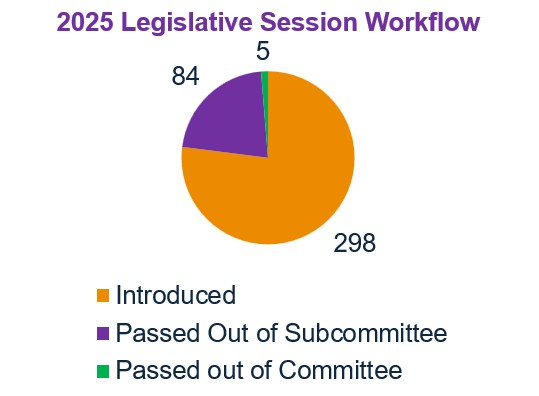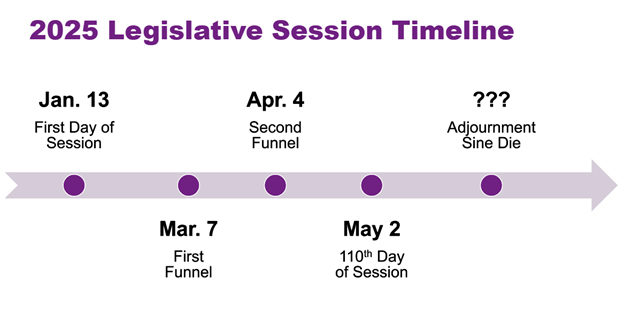The 91st General Assembly reconvened at the Capitol on Tuesday for a shortened week due to the Martin Luther King Jr. holiday and the inauguration of President Donald Trump. However, legislators hit the ground running and made the most of the week.
Legislative Activity
Last week, there were over 150 new bill introductions between both chambers, and 84 bills passed out of subcommittee. Five bills passed out of committee and are eligible for floor debate. Typically, there are more bill introductions in the first year of a general assembly, and this holds true for the 91st General Assembly. Nearly 400 bills were introduced in the first two weeks alone.

Legislators still have until February 14 to request bill and joint resolution drafts to the Legislative Services Agency (LSA), so many more draft requests and bill introductions are expected.
Hands-Free Driving
SF 22 and HSB 64 both address hands-free driving in the state of Iowa, prohibiting drivers from touching or holding a phone. Passing legislation related to the usage of cell phones in vehicles was an expressed priority of Governor Reynolds during her Condition of the State. SF 22 passed subcommittee earlier this week, and HSB 64 has a scheduled subcommittee next week. These bills must pass their respective committees, and an identical version must pass a floor vote in both chambers in order for a bill to be enrolled and sent to the Governor.
Families First Bill
The second of the Governor’s priorities to move through the legislature relates to paid leave for parents. The Families First Bill introduced in both the Iowa House and Senate would provide four weeks of paid maternity leave and one week of paid paternity leave for state employees. Additionally, the bill allows for four weeks of paid leave for state employees who adopt a child. As of now, state employees are not offered paid parental leave.
In the accompanying press release, Governor Reynolds stated:
“Nothing is more important to me than family,” Governor Reynolds said. “The time after birth is a crucial bonding period for new parents and their babies, and it’s time state employees have a chance to be fully present for them. Under President Donald Trump’s leadership, federal employees were granted up to 12 weeks of paid leave to care for a child, and at least 24 other states have some form of paid leave. Let’s pass this bill and put families first.”
National Guard Scholarships
Another major priority gaining traction from the opening addresses last week was Major General Stephen Osborn’s request to expand the Iowa National Guard Service Scholarship program in his Condition of the Guard. HF 117 would establish the National Guard Service Professional Qualification scholarship program, and HF 118 would ensure the scholarship amount does not exceed the difference between a National Guard member’s tuition and federal financial aid. Both bills were among the first to pass both subcommittee and committee and were placed on the House calendar for consideration by the full House chamber.
Casino Moratorium
The Iowa Racing and Gaming Commission is set to meet on February 6 to discuss the proposed Cedar Rapids casino. However, legislation was introduced at the end of the week that would place a moratorium on new casino licenses. HSB 80 would retroactively begin a moratorium on January 1, 2025, and last through June 30, 2030, among other provisions. The previous casino moratorium expired on June 30, 2024, and Cedar Rapids moved quickly to propose a $275 million facility, the Cedar Crossing Casino and Entertainment Center. HSB 80 has a subcommittee scheduled for Monday, January 27, and the House Ways and Means Committee is set to meet that evening. SF 76 would place an identical moratorium on new casinos in the state, but a subcommittee has not yet been assigned or scheduled.
What’s next?
This week, the legislature will be back for a full week of legislative action, and committee action will continue, which will make more bills eligible for calendar placement and floor debate. Legislators have three more weeks to request bill drafts and joint resolutions, which is the first major milestone of the 2025 legislative session.



